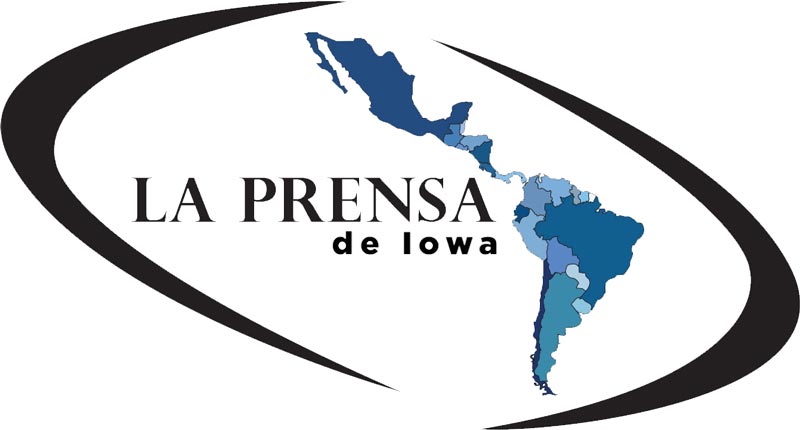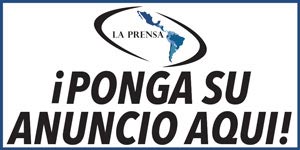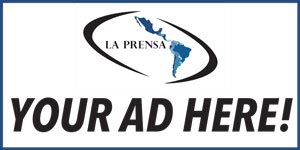Estafadores asechan la comunidad de Denison
/De acuerdo con el director de actividades de Denison High School Derek Fink, este incidente de fraude no era el primero que afectaba a la comunidad ya que hace años otros estafadores habían tratado de defraudar a la comunidad al pedir dinero en nombre de la escuela. Ashley Martínez Torres/Especial para LA PRENSA Iowa.
Ashley Martínez Torres
Especial para LA PRENSA Iowa
Recientemente Denison se vio asechada por estafadores que se hacen pasar por una compañía que supuestamente trabaja directamente con Denison High School.
La supuesta compañía North Star Publishing Co., ha contactado a varios miembros de la comunidad y negocios locales para ofrecerles convertirse en patrocinadores financieros de las escuelas y a cambio ofrecen un poster con el logo del negocio o el nombre del patrocinador.
Un miembro de la página de Facebook “You are from Denison (Iowa)” compartió una alerta sobre la estafa junto con una imagen de la correspondencia que recibió. Varios usuarios comentaron al respecto. Brett Brodersen quien es el moderador de la página, comentó. “Cuando vi la publicación, me puse a investigar para ver si era una alerta real, porque si no entonces la publicación seria borrada.”
Brett Brodersen es dueño de una agencia privada de investigación con licencia del estado de Nebraska, y como moderador su deber es asegurarse que las publicaciones sigan el reglamento de la página, por lo que decidió investigar si la alerta sobre la estafa era real.
Durante su investigación, el descubrió que la dirección física era de una tienda UPS en un centro comercial, lo cual no es típico de una compañía de imprenta. Después, al revisar la división de corporaciones en el estado, se dio cuenta de que no se trataba de una compañía de Iowa.
Finalmente, Brett se contactó con la compañía, “Fue una llamada sospechosa y no me daban respuestas directas a mis preguntas.”
Brett agregó que su investigación dio a luz más detalles sobre el incidente, pero debido que la información tiene un valor potencial como evidencia, no la pudo compartir con este medio ya que entregó las evidencias a las autoridades y el caso está bajo investigación.
Usuario en Facebook Nicole Zaragoza compartió este recibo que le llegó de North Star Publishing Co, quien decía trabajar con Denison High School, pero rápidamente se dio cuenta de que era una estafa, por lo que compartió un aviso en la plataforma sobre lo sucedido. Foto cortesía de Nicole Zaragoza en Facebook.
Cabe agregar que al buscar la compañía en la división de corporaciones del estado de California, aparecen cuatro resultados de los cuales uno tiene un estatus de terminado y los otros tres de suspendidos.
A pesar de este aviso de alerta, ha habido personas de Denison que cayeron ante las promesas de los estafadores como fue el caso de José Patiño, quien es dueño de una compañía de remolque.
José compartió con este medio, “A mí me estafaron en dos llamadas telefónicas. La primera fue telefónica realizada por una mujer que se identificó con el nombre de Alondra López, me dijo que trabajaba en la escuela de Denison, y que me estaba ofreciendo ser un patrocinador de la escuela, y que a cambio iban a poner el logotipo de mi negocio en un poster.” José dijo que aceptó ser un patrocinador porque cree en apoyar a las escuelas. “Saqué mi tarjeta de banco y autoricé 130 dólares.”
Una semana después, José recibió la segunda llamada telefónica de la misma supuesta Alondra, que le dijo que su hermano Ramon Patiño ya se había convertido en un patrocinador por segunda vez, y que seria bueno él también lo hiciera. “Pues volví a sacar mi tarjeta y le autoricé 150 dólares más, explicó José.”
José dijo que la mujer, le dijo que, para enviarle el logo de su compañía de remolque, él necesitaba ingresar a una página electrónica que la mujer le dio. “…pero salía que la pagina no existía. Les trate de llamar a su número de oficina, pero el numero tampoco servía,” explicó.
Fue entonces, que José empezó a sospechar que había sido estafado. “Llamé a mi hermano Ramon para preguntarle si él había podido mandar el logo de su tienda, pero mi hermano no sabio de lo que yo le estaba hablando; y cuando le conté todo, el me dijo que nunca lo habían llamado o que no confiara en esas llamadas.”
Al confirmar que había sido víctima de una estafa, José fue directamente a hacer un reporte con la policía. “La policía no sirvió de nada, porque me dijeron que no había nada que pudieran hacer ya que es difícil encontrar a este tipo de personas,” el comentó con molestia. “Después de la policía fui a mi banco, y ellos me ayudaron a recuperar mi dinero.”
Al parecer, la supuesta Alondra volvió a contactar a José para avisarle que había habido un problema con los pagos que él había autorizado y que sería mejor que usara otro tipo de tarjeta. “Unos días después me volvió a llamar, pero ya no le conteste.”
El l Jefe de Policía de Denison Brandon Rinnan, comentó “Algo que el público debe de entender es que la información que esta gente [los estafadores] tiene de las personas que llaman puede ser encontrada en línea, ya que es información pública.”
Mientras que es recomendado que las personas afectadas reporten una estafa al departamento de policía, Brandon explicó que investigar estafas es complicado. “Los estafadores pueden trabajar fuera del estado o incluso fuera del país, y hasta usar números falsos.”
“Cuando alguien te llame para pedirte dinero, siempre cuestiona para que piensa usarlo y, si es posible, comunícate con la organización que están representando directamente para asegurarte de que sea real,” aconsejó Brandon.
Por su parte el director de Actividades de Denison High School Derek Fink dijo, “Hemos sido presa de este tipo de incidentes en el pasado, como hace cuatro a cinco años, y los estafadores van de comunidad en comunidad diciendo que son parte de la escuela o que están ayudando a la escuela.” Agregó, “Nuestra comunidad es muy bondadosa y apoya a nuestras escuelas, así que es fácil de que los estafadores tomen ventaja de las personas y de los negocios locales.”
De acuerdo con Derek, la escuela trabaja con PPP Design, un negocio local de imprenta y diseño de sitos en línea, quien está a cargo de enviar información de la escuela a negocios o periódicos locales.
Cabe mencionar, que después que el distritro escolar de Denison se enteró de lo ocurrido, la escuela se comunicó con la Camara de Comericio de Denison, para que esta enviara una alerta de fraude a los negocios.
Este artículo es patrocinado por Western Iowa Journalism Foundation.
Translation
Scammers attack Denison community
According to Denison High School Activities Director Derek Fink this wasn’t the first scam incident affecting the community; four to five years ago, other scammers tried to use the same excuse that they were collecting money on the name of the schools. Ashley Martínez Torres/Special for LA PRENSA Iowa
Ashley Martínez Torres
Special for LA PRENSA Iowa
Last month, the Denison community was attacked by scammers posing as a company that worked directly with Denison High School and scammed citizens out of money.
Several community members were contacted by representatives of North Star Publishing Co., who were offering small businesses to become sponsors of the school and in return the school would put up a poster with each company's logo at the gym or baseball fields.
A member of the Facebook page "You are from Denison (Iowa)" warned the members of the page about this incident on Nov. 16 along with an image of the mail she received. Several users commented on it, one of them being Brett Brodersen who is moderator of the page.
"When I saw the post, I started researching to see if it was a real alert, because if not then the post would be deleted," he said.
Facebook user Nicola Zaragoza shared this bill from North Star Publishing Co, who said that worked with Denison High School, but quickly realized it was an scam, which is why published a warning on social media about it. Photo courtesy of Nicole Zaragoza on Facebook.
Brodersen owns a private investigative agency licensed by the state of Nebraska, and as a moderator his duty is to make sure that the posts follow the page’s policy, so he decided to investigate if the warning about the scam was real.
During his investigation, he discovered that the physical address was from a UPS store in a shopping mall, which is not typical for a printing company. Later, when reviewing the division of corporations in the state, he realized that it was not an Iowa company.
Finally, when he contacted the company he described it as a “suspicious call” since “they wouldn't give me direct answers to my questions."
Brodersen added that he found more details about the company during his investigation, but because it has potential evidential value, he could not share it with this media since he gave this information to the authorities.
Additionally, after researching for the publishing company in the division of corporations of the state of California, four status results appeared as one being terminated and the other three suspended.
Despite this warning about the scam, there were people who fell for the promises of scammers as was the case of José Patiño, who owns a towing company.
He received a call from a woman calling herself Alondra López, and she explained that she worked at the school and offered him to become a sponsor of the school, so he accepted.
"I was supposed to send my logo to their website, but it came out that the page didn't exist. I tried to call them at their office number, but the number didn't work either," he explained.
After realizing he had been scammed, Patiño went straight to make a report to the police, talk to his bank, and inform the school about what was going on.
"The police didn't help, because they told me there was nothing they could do as it's hard to find these kinds of people," he added angrily. "At least my bank was able to help me get my money back on more than one occasion."
Apparently, "Alondra" contacted him again a couple of weeks later to let him know there was a problem with the payment and ask if he was sure to help the school. At the time, Patiño had forgotten what had happened and handed over his information to the woman again.
"I wasn’t paying attention the second time she called," he said. "However, she started insisting that my card wasn't going through and asked me for another card number; That's when I started doubting her."
Patiño told the woman that it would be better if he went straight to school to pay her, but "Alondra" insisted that he didn't need to show up, which only heightened his suspicions. In the end, the payment went through and Patiño received an invoice for the service.
"I tried to access the page, but it kept saying it didn't exist, so I went back to my bank to cancel the payment," he explained. "A few days later she called me again, but I didn't answer her anymore."
In total, Patiño had almost lost about $280, but he managed to get his money back.
Many may be thinking ‘how it is possible that Patiño fell in this scam twice? The truth is that what made him trust "Alondra" is because she told him that his brother Ramón had already worked with North Star Publishing, but when Patiño contacted his brother he denied it.
"I had never been scammed before, because I always try to be careful, but they made me feel confident by saying they knew my brother and that this was a way to help the school," he said. "In the end it wasn't what I expected, but it is just another life experience."
According to Denison Police Chief Brandon Rinnan, "One thing you need to understand is that the information these people have about you can be found online, because it's publicly available information, and a lot of times scammers prepare for what they're going to do, this is one of the reasons why a lot of people end up trusting these people."
While it is recommended that affected individuals report a scam to the police department, Rinnan explained that investigating scams is complicated since scammers can work out of state or even the country and use spoof numbers.
"When someone calls you to ask for money, always question what they intend to use it for and, if possible, contact the organization they are representing directly to make sure it is real," he advised.
"We've fallen prey to these kinds of incidents in the past, like four to five years ago, and whoever does these scams seems to go from community to community saying they're part of the school or they're helping the school," said Denison High School Activities Director Derek Fink. "Fortunately, or unfortunately, our community is very kind and supportive of our schools, so it's easy for [the scammers] to take advantage of local people and businesses."
According to Fink, the school works with PPP Design, a local printing and site design business, which is in charge of sending school information to local businesses or newspapers.
"Most of the time if the entity or person hasn't worked with the school before, it's possible it's a scam," he said. "The school doesn't normally work with third parties, so it's unfortunate for those who thought they were helping the school, but it wasn't the case."
After learning what happened, the school contacted the CDC to send a statement to the community about the scam and shared a message on the school's Facebook page about the incident.
Fink said that, at press time, they have received no more reports about the scammers. However, he advises the community that "if you receive calls from an unknown number pretending to be the school, be sure to ask before giving out any private information," he added.
This article is sponsored by the Western Iowa Journalism Foundation.










































